Holly Thompson's Blog, page 35
January 30, 2012
Lucille Clifton and My Students in Japan
As the university academic year comes to a close in Japan, my writing students have been busy with final writing portfolios. Students in my poetry classes also give readings of their own poems.
When students enter my poetry classes, most have never written poems in their native language, let alone in English. There is plenty of befuddlement and wariness at the beginning of the term, yet I am always amazed to observe the change as students gain the tools to talk about poetry, to critique others' poems, and to write, revise and finally read their own works before the class . . . in just 15 weeks.
To prepare for readings, I show my students video clips from the Geraldine R. Dodge Poetry Festival. I try to share a range of poets and reading styles, but every year I'm certain to show videos of the late Lucille Clifton reading. Her style--the pausing, the enunciation, the unhurried and dignified pace of her readings--and her words--with humor and tragedy deftly intertwined--stun and move my students. She is always an inspiration.
In the final classes this term, my students shared words of introduction to each of the poems they'd selected, then read . . . with pauses and stress, humor and emotion and a love of words. I was moved. There were poems of crushes and break-ups, mistakes and triumphs; odes to bras, convenience stores, futons, and Korean dramas; and narrative poems of poignant and personal memories. There were poems created from grim news reports; poems of surprising honesty; wry cinquain poems that drew chuckles; poems of the tsunami and nuclear plant disaster; and poems of hope.
Though there are often complaints over the amount of homework required for this course, in the end, most students say they feel proud of their accomplishments. But my all-time favorite student comment this year was . . . "We should have a poetry conference!"
When students enter my poetry classes, most have never written poems in their native language, let alone in English. There is plenty of befuddlement and wariness at the beginning of the term, yet I am always amazed to observe the change as students gain the tools to talk about poetry, to critique others' poems, and to write, revise and finally read their own works before the class . . . in just 15 weeks.
To prepare for readings, I show my students video clips from the Geraldine R. Dodge Poetry Festival. I try to share a range of poets and reading styles, but every year I'm certain to show videos of the late Lucille Clifton reading. Her style--the pausing, the enunciation, the unhurried and dignified pace of her readings--and her words--with humor and tragedy deftly intertwined--stun and move my students. She is always an inspiration.
In the final classes this term, my students shared words of introduction to each of the poems they'd selected, then read . . . with pauses and stress, humor and emotion and a love of words. I was moved. There were poems of crushes and break-ups, mistakes and triumphs; odes to bras, convenience stores, futons, and Korean dramas; and narrative poems of poignant and personal memories. There were poems created from grim news reports; poems of surprising honesty; wry cinquain poems that drew chuckles; poems of the tsunami and nuclear plant disaster; and poems of hope.
Though there are often complaints over the amount of homework required for this course, in the end, most students say they feel proud of their accomplishments. But my all-time favorite student comment this year was . . . "We should have a poetry conference!"
Published on January 30, 2012 22:21
January 27, 2012
Orchards receives APALA Asian/Pacific Award for Literature
Happy dancing this week! My novel Orchards received the 2012 APALA Asian/Pacific Award for Literature in the Young Adult Literature category.
This wonderful bit of ALANews was announced at the American Library Association (ALA) midwinter conference. Administered by the Asian/Pacific American Libraries Association (APALA), APALA Asian/Pacific American Awards, as stated on the ALANews release, "honor and recognize individual works about Asian/Pacific Americans and their heritage with exceptional literary and artistic merit. The awards are given in five categories, including Adult Fiction, Adult Non-Fiction, Children's Literature, Young Adult Literature and Picture Book." I am so thrilled with this honor.
Also this week I learned that Orchards is a YALSA 2012 Best Fiction for Young Adults. Double woohoo!
An auspicious start to the year of the dragon (knock wood...). I am deeply appreciative of this affirmation and encouragement as I go about tackling my next complicated writing projects. Fiction writing just never gets easier...
This wonderful bit of ALANews was announced at the American Library Association (ALA) midwinter conference. Administered by the Asian/Pacific American Libraries Association (APALA), APALA Asian/Pacific American Awards, as stated on the ALANews release, "honor and recognize individual works about Asian/Pacific Americans and their heritage with exceptional literary and artistic merit. The awards are given in five categories, including Adult Fiction, Adult Non-Fiction, Children's Literature, Young Adult Literature and Picture Book." I am so thrilled with this honor.
Also this week I learned that Orchards is a YALSA 2012 Best Fiction for Young Adults. Double woohoo!
An auspicious start to the year of the dragon (knock wood...). I am deeply appreciative of this affirmation and encouragement as I go about tackling my next complicated writing projects. Fiction writing just never gets easier...
Published on January 27, 2012 01:14
January 17, 2012
A Box of...Nishiura Mikan!
The other day a wonderful package arrived at our house--a large, heavy box.

Inside were...
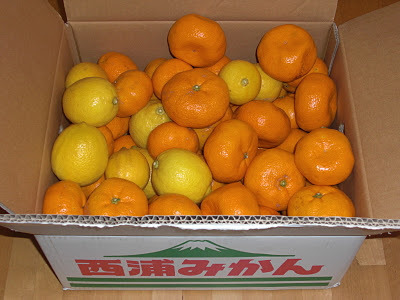
lots of mikan (Japanese mandarin oranges) and lemons from the orchards in the Nishiura district of the Izu Peninsula in Shizuoka where I had worked with a farm family when doing research for Orchards (see earlier posts here and here).
In the months when I worked at the farm and lived in one of the mikan growing villages, I ate mikan every day, often 3 or 4 a day. Oh, they were good--I have never tasted better mikan. So what a treat to receive this boxful from the farm family!
Besides the tasty contents, I love the box itself. Why the graphic of Mount Fuji on the side?
Well, because the scenery from Nishiura is like this:
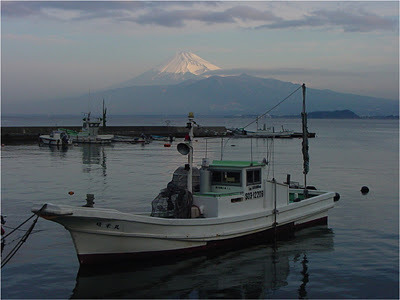 and this:
and this:
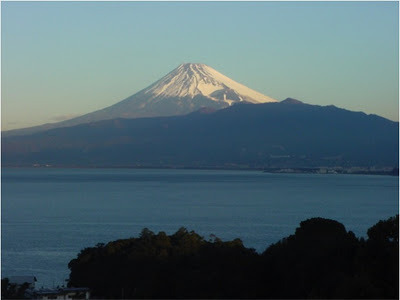 Both photos were taken at sunrise as I was about to join the farm family for the day working in the mikan groves. Views like these helped me quickly forget about my cold hands and toes. I miss the farm family, the Nishiura hills and that spectacular setting and look forward to my next chance to visit...which will have to be very soon because we are already halfway through that box of mikan.
Both photos were taken at sunrise as I was about to join the farm family for the day working in the mikan groves. Views like these helped me quickly forget about my cold hands and toes. I miss the farm family, the Nishiura hills and that spectacular setting and look forward to my next chance to visit...which will have to be very soon because we are already halfway through that box of mikan.

Inside were...

lots of mikan (Japanese mandarin oranges) and lemons from the orchards in the Nishiura district of the Izu Peninsula in Shizuoka where I had worked with a farm family when doing research for Orchards (see earlier posts here and here).
In the months when I worked at the farm and lived in one of the mikan growing villages, I ate mikan every day, often 3 or 4 a day. Oh, they were good--I have never tasted better mikan. So what a treat to receive this boxful from the farm family!
Besides the tasty contents, I love the box itself. Why the graphic of Mount Fuji on the side?
Well, because the scenery from Nishiura is like this:
 and this:
and this: Both photos were taken at sunrise as I was about to join the farm family for the day working in the mikan groves. Views like these helped me quickly forget about my cold hands and toes. I miss the farm family, the Nishiura hills and that spectacular setting and look forward to my next chance to visit...which will have to be very soon because we are already halfway through that box of mikan.
Both photos were taken at sunrise as I was about to join the farm family for the day working in the mikan groves. Views like these helped me quickly forget about my cold hands and toes. I miss the farm family, the Nishiura hills and that spectacular setting and look forward to my next chance to visit...which will have to be very soon because we are already halfway through that box of mikan.
Published on January 17, 2012 23:33
December 30, 2011
Kyoto, Machiya and Kizuna
This week we took a short trip to Kyoto, and rather than stay in a hotel, we opted for a recently renovated machiya or old Kyoto style townhouse. Kyoto machiya have been disappearing--torn down and replaced by new houses, condominiums and parking lots--at an alarming rate for the past few decades, but fortunately there are now individuals and organizations that have been making efforts to preserve and renovate them as homes, shops and rental accommodations. In my novel Ash, the characters Caitlin and Naomi stay at Naomi's aunt's machiya, hence on the World of Ash website there is a section on traditional Kyoto architecture. This trip we stayed at the charming renovated machiya Suoan, a small two-story building with a tsuboniwa (tiny courtyard garden). A few doors away from Suoan was a popular sento (public bath) that we made full use of in the evenings after wintry days of touring about.
Kyoto is one of my favorite places in Japan. Tucked away are so many extraordinary sights and experiences, and the food is incredible.
In addition to central Kyoto, we visited the Fushimi district in the south...
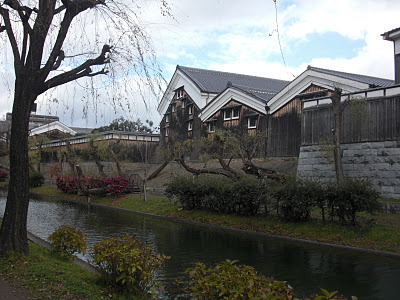 Sake warehouses in Fushimi
Sake warehouses in Fushimi
 Some of the 1,000 or so torii gates at Fushimi Inari Taisha (shrine)the Arashiyama district in the west...
Some of the 1,000 or so torii gates at Fushimi Inari Taisha (shrine)the Arashiyama district in the west...
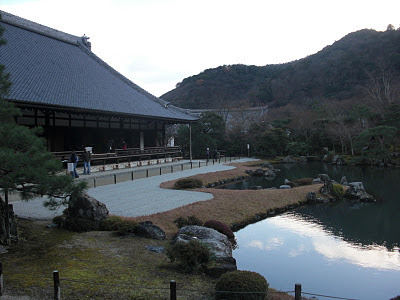 World Heritage temple Tenryuji
World Heritage temple Tenryuji
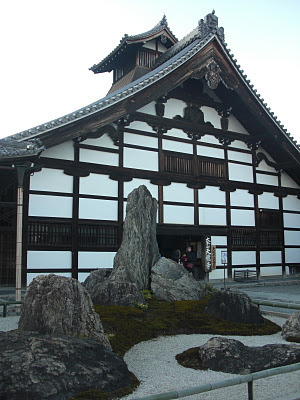 Tenryuji
Tenryuji
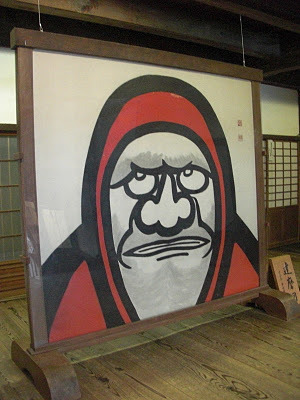 Daruma painting at Tenryujiand the Ohara district in the north...
Daruma painting at Tenryujiand the Ohara district in the north...
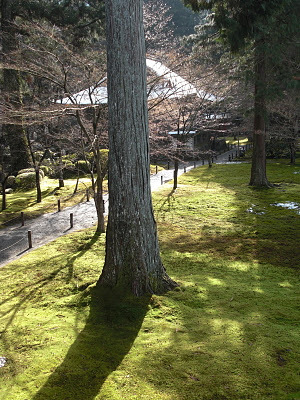 Sanzen-in
Sanzen-in
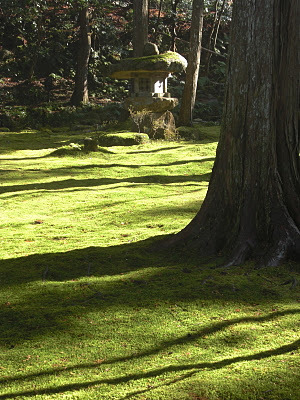 Sanzen-in
Sanzen-in
 Sanzen-inwhere the morning sunlight on moss glistening with snowmelt was breathtaking.
Sanzen-inwhere the morning sunlight on moss glistening with snowmelt was breathtaking.
And we visited Kyomizudera in the east...
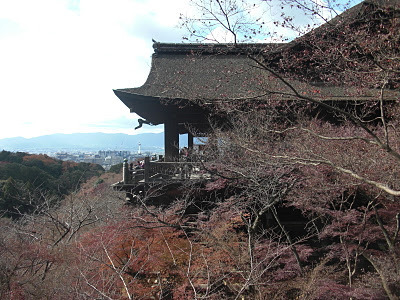 Kiyomizudera (temple)specifically to see the kanji of the year, kizuna 絆...
Kiyomizudera (temple)specifically to see the kanji of the year, kizuna 絆...
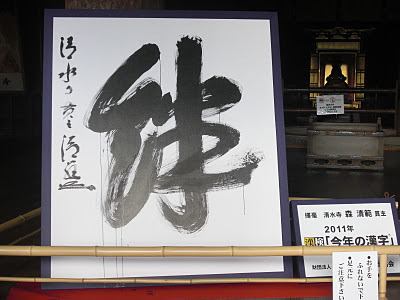
meaning bonds or connections, a kanji and concept that gained deep meaning nationwide after the 3/11 earthquake and tsunami.
And to close, this post and this year, here is a hauntingly beautiful piece Kizuna--Prayer for Japan featuring pianist Ryuichi Sakamoto and art by Valerio Berruti.
Kyoto is one of my favorite places in Japan. Tucked away are so many extraordinary sights and experiences, and the food is incredible.
In addition to central Kyoto, we visited the Fushimi district in the south...
 Sake warehouses in Fushimi
Sake warehouses in Fushimi
 Some of the 1,000 or so torii gates at Fushimi Inari Taisha (shrine)the Arashiyama district in the west...
Some of the 1,000 or so torii gates at Fushimi Inari Taisha (shrine)the Arashiyama district in the west... World Heritage temple Tenryuji
World Heritage temple Tenryuji
 Tenryuji
Tenryuji
 Daruma painting at Tenryujiand the Ohara district in the north...
Daruma painting at Tenryujiand the Ohara district in the north... Sanzen-in
Sanzen-in
 Sanzen-in
Sanzen-in
 Sanzen-inwhere the morning sunlight on moss glistening with snowmelt was breathtaking.
Sanzen-inwhere the morning sunlight on moss glistening with snowmelt was breathtaking.And we visited Kyomizudera in the east...
 Kiyomizudera (temple)specifically to see the kanji of the year, kizuna 絆...
Kiyomizudera (temple)specifically to see the kanji of the year, kizuna 絆...
meaning bonds or connections, a kanji and concept that gained deep meaning nationwide after the 3/11 earthquake and tsunami.
And to close, this post and this year, here is a hauntingly beautiful piece Kizuna--Prayer for Japan featuring pianist Ryuichi Sakamoto and art by Valerio Berruti.
Published on December 30, 2011 05:25
December 14, 2011
Fortunately...Unfortunately--Today's Version
Fortunately, I keep cloud and external hard drive back ups.
Unfortunately...late at night as I complete one final task--compiling contact info of Japanese poets for an organizer of a poetry festival in Vietnam--my new MacBook freezes.
Fortunately...I have an old MacBook I can dust off, and in the morning the draft email can still be accessed on old MacBook and sent.
Unfortunately...new MacBook remains frozen.
Fortunately...I don't have morning classes and can talk at length with Japan's Apple support.
Unfortunately...support says no appointments are available at the Apple store in Shibuya until Friday.
Fortunately...there is a late afternoon appointment available in Ginza, so I change my email password to be safe, and take old computer and new computer to the university.
Unfortunately...old computer has trackpad problems of its own, and it, too, freezes.
Fortunately...I have the appointment at the Apple store, so I can take both MacBooks and in the meantime access gmail on my iPhone.
Unfortunately...changing my email password means that gmail no longer works on my iPhone.
Fortunately...the Apple store employee says all the right kind words.
Unfortunately...new MacBook will take a week to repair; old MacBook will take a week to repair.
Fortunately...nice Apple store employee heeds my plaintive tone and scrambles to arrange for a repair of old MacBook today.
Unfortunately...gmail on iPhone won't be accessible for two days and rush work on Tomo galley corrections will be tough using old MacBook.
Fortunately...when I get home, a wonderful Cambodian curry dinner is waiting. And there is an email from the festival organizer with an official invitation to all the poets I suggested to her PLUS an official invitation to me as well to present at the Asian Poetry Festival in February in Hanoi, Vietnam.
Whew!
Inspired by Remy Charlip's Fortunately.
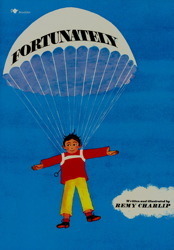

Unfortunately...late at night as I complete one final task--compiling contact info of Japanese poets for an organizer of a poetry festival in Vietnam--my new MacBook freezes.
Fortunately...I have an old MacBook I can dust off, and in the morning the draft email can still be accessed on old MacBook and sent.
Unfortunately...new MacBook remains frozen.
Fortunately...I don't have morning classes and can talk at length with Japan's Apple support.
Unfortunately...support says no appointments are available at the Apple store in Shibuya until Friday.
Fortunately...there is a late afternoon appointment available in Ginza, so I change my email password to be safe, and take old computer and new computer to the university.
Unfortunately...old computer has trackpad problems of its own, and it, too, freezes.
Fortunately...I have the appointment at the Apple store, so I can take both MacBooks and in the meantime access gmail on my iPhone.
Unfortunately...changing my email password means that gmail no longer works on my iPhone.
Fortunately...the Apple store employee says all the right kind words.
Unfortunately...new MacBook will take a week to repair; old MacBook will take a week to repair.
Fortunately...nice Apple store employee heeds my plaintive tone and scrambles to arrange for a repair of old MacBook today.
Unfortunately...gmail on iPhone won't be accessible for two days and rush work on Tomo galley corrections will be tough using old MacBook.
Fortunately...when I get home, a wonderful Cambodian curry dinner is waiting. And there is an email from the festival organizer with an official invitation to all the poets I suggested to her PLUS an official invitation to me as well to present at the Asian Poetry Festival in February in Hanoi, Vietnam.
Whew!
Inspired by Remy Charlip's Fortunately.

Published on December 14, 2011 04:29
December 3, 2011
Tomo Anthology Update
I'm happy to announce the launch of the Tomo anthology contributor interviews on the Tomo blog (tomoanthology.blogspot.com)! The first interview features Alan Gratz, author of The Brooklyn Nine and Samurai Shortstop and other books. Baseball, ghosts and fiction writing are all touched on in this Alan Gratz interview.
Publication date for Tomo: Friendship Through Fiction--An Anthology of Japan Teen Fiction is March 10, 2012. ARCs are now being printed, and here is the updated cover.
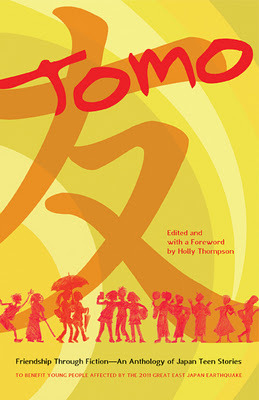
From now until launch date I will be uploading two or three Tomo contributor interviews per week on the Tomo blog. With over forty contributors, that's a lot of interviews!
Proceeds from the sales of the Tomo anthology will benefit teens in Tohoku affected by the 3/11 earthquake and tsunami, and soon I look forward to sharing news about where exactly the Tomo funds will be directed. Stay tuned!
Publication date for Tomo: Friendship Through Fiction--An Anthology of Japan Teen Fiction is March 10, 2012. ARCs are now being printed, and here is the updated cover.

From now until launch date I will be uploading two or three Tomo contributor interviews per week on the Tomo blog. With over forty contributors, that's a lot of interviews!
Proceeds from the sales of the Tomo anthology will benefit teens in Tohoku affected by the 3/11 earthquake and tsunami, and soon I look forward to sharing news about where exactly the Tomo funds will be directed. Stay tuned!
Published on December 03, 2011 22:40
November 23, 2011
Manila International Literary Festival
Last week I attended and presented at the second Manila International Literary Festival, dubbed The Great Philippine Book Cafe. Sponsored by the National Book Development Board and held at the Ayala Museum, the three-day festival was a wonderful introduction to the Manila writing scene and a chance for me to meet some familiar and many new faces. The organizers did an outstanding job with the ambitious program, and I thank Neni Sta. Romana Cruz and Andrea Pasion-Flores for inviting me.
Day 1 I had no presentations so was able to mingle and listen to presentations. The keynote talk by Resil Mojares "Where in the World is the Filippino Writer?" was followed by "Writing from the Margins" featuring Pulitzer prize winners Junot Diaz and Edward P. Jones, including short readings of their work. Discussion ranged from similarities between the Philippines and the Dominican Republic, race as an undercurrent in the U.S., the authors' role models, the differences between short stories and novels, and the thinking groundwork for a novel (ten years of thinking for Edward P. Jones's The Known World).
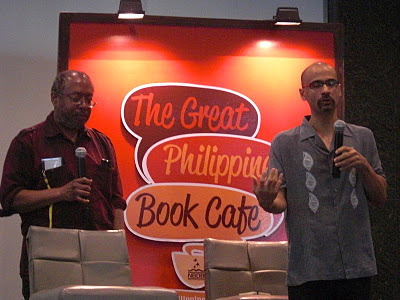 Edward P. Jones and Junot Diaz
Edward P. Jones and Junot Diaz
In the afternoon I floated a bit, and peeked in on "In Search of the Next Great Philippine Novel" with authors Jose Dalisay, Jr., Charlson Ong, Alfred Yuson and Edgar Samar.
Following those I attended the lively "Conversation with Junot Diaz." His talk covered his personal background, reading, writing, history and its interplay with writing, and the obligation for every artist to strive to do what no one else is doing. Powerful.
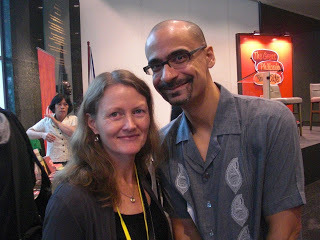 with Junot DiazBook blogger Tarie Sabido then introduced me to her circle of book blogging friends who took me out to sample a few Filipino dishes and a weng weng drink before I attended the dinner for speakers at the Ayala Library.
with Junot DiazBook blogger Tarie Sabido then introduced me to her circle of book blogging friends who took me out to sample a few Filipino dishes and a weng weng drink before I attended the dinner for speakers at the Ayala Library.
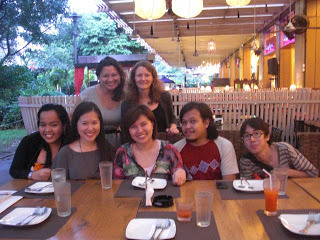 with Tarie Sabido, standing, and book bloggers and friendsDay 2 I had three panel presentations. First was "The Stranger Experience" on writing away from home, cross-cultural experiences, and the multi-faceted immigration experience with Junot Diaz, Gemma Nemenzo and me.
with Tarie Sabido, standing, and book bloggers and friendsDay 2 I had three panel presentations. First was "The Stranger Experience" on writing away from home, cross-cultural experiences, and the multi-faceted immigration experience with Junot Diaz, Gemma Nemenzo and me.
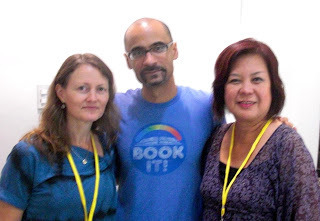 with Junot Diaz and Gemma Nemenzo, Managing Editor of the U.S. magazine FilipinasNext was a panel on writing for young adults with author Perpi Alipon-Tiongson and publisher RayVi Sunico.
with Junot Diaz and Gemma Nemenzo, Managing Editor of the U.S. magazine FilipinasNext was a panel on writing for young adults with author Perpi Alipon-Tiongson and publisher RayVi Sunico.
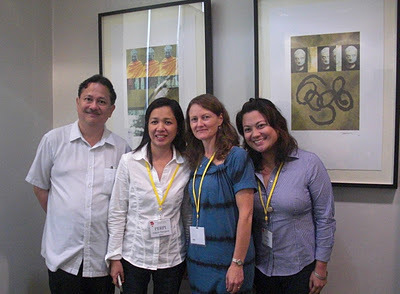 with RayVi Sunico, Perpi Alipon-Tiongson and Tarie SabidoBook bloggers then took me to Via Mare for more excellent Filipino food for lunch.
with RayVi Sunico, Perpi Alipon-Tiongson and Tarie SabidoBook bloggers then took me to Via Mare for more excellent Filipino food for lunch.
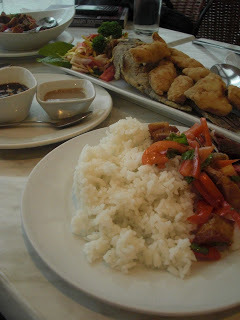
After lunch I caught part of "Of Folktales, Myths and Legends" featuring authors who have drawn inspiration from the folklore of the Philippines--I wished I'd been able to catch more about the intriguing tales and legends. And after that I presented on a panel "The Many Forms of the Novel" in which I spoke about writing in verse and read an excerpt from Orchards. I was pleased to meet Que Mai, poet from Vietnam and to come home with one of her books of poetry. I expect she'll be coming out with a novel in verse in the future... It was exciting to share the news of Thanhha Lai's National Book Award win with her on the day it was announced.
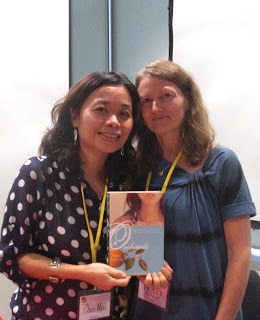 with poet Que MaiThat evening I was invited to the home of Yvette Fernandez, Editor-in-Chief of the Philippines Town and Country magazine. There I enjoyed a Filipino feast, a bit more conversation with Junot Diaz before he left for the airport, family conversations, and amazing mango, rice cake and turon (banana rolls).
with poet Que MaiThat evening I was invited to the home of Yvette Fernandez, Editor-in-Chief of the Philippines Town and Country magazine. There I enjoyed a Filipino feast, a bit more conversation with Junot Diaz before he left for the airport, family conversations, and amazing mango, rice cake and turon (banana rolls).
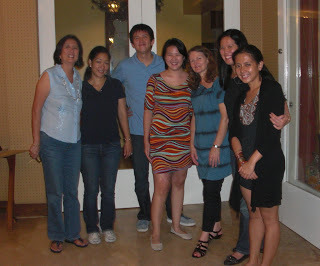 Filipino hospitalityAnd I learned that there are some impressive beetles in the Philippines.
Filipino hospitalityAnd I learned that there are some impressive beetles in the Philippines.
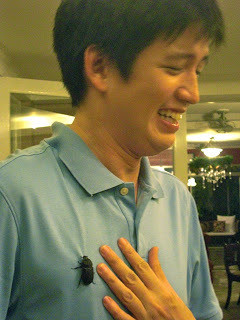
Friday morning I caught up with Nikki Torres, Assistant Regional Advisor of SCBWI Philippines, at an early breakfast meeting--it was so good to meet face to face. Next time I'm in the Philippines I hope to have more time to do an event with the chapter.
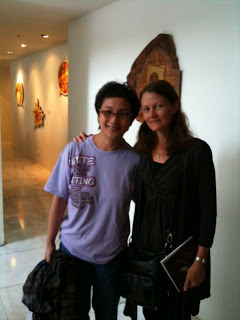 with Dominique (Nikki) Garde TorresAt the festival Day 3, I attended the panel "Mentoring the Writer" with Jayapriya Vasudevan and Priya Doraswamy of Jacaranda Press, Rachel Kahan, Senior Editor at G.P. Putnam, and Ravi Mirchandani, Editor-in-Chief of Atlantic Books U.K., which opened with a contract signing with crime writer F. H. Batacan.
with Dominique (Nikki) Garde TorresAt the festival Day 3, I attended the panel "Mentoring the Writer" with Jayapriya Vasudevan and Priya Doraswamy of Jacaranda Press, Rachel Kahan, Senior Editor at G.P. Putnam, and Ravi Mirchandani, Editor-in-Chief of Atlantic Books U.K., which opened with a contract signing with crime writer F. H. Batacan.
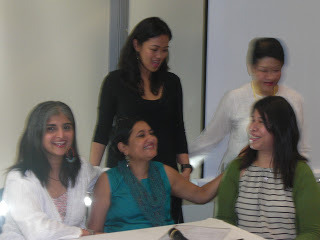 Blurry, but a great celebratory moment with Priya Doraswamy and Jayapriya Vasudevan and F. H. Batacan, seated, with NBDB's Andrea Pasion-Flores and Neni Sta. Romana Cruz in the back
Blurry, but a great celebratory moment with Priya Doraswamy and Jayapriya Vasudevan and F. H. Batacan, seated, with NBDB's Andrea Pasion-Flores and Neni Sta. Romana Cruz in the back
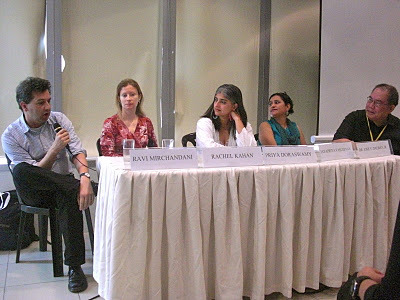 Ravi Mirchandani (Atlantic U.K.), Rachel Kahan (G. P. Putnam), Priya Doraswamy (Jacaranda Press), Jayapriya Vasudevan (Jacaranda Press) and author Jose Dalisay, Jr.Next up was "A Conversation with Edward P. Jones" in which he shared his background and his amazing brain that held the details of his book The Known World for ten years before he began writing. He spoke on revision, the importance of reading, and the need for everyone to discover their talent.
Ravi Mirchandani (Atlantic U.K.), Rachel Kahan (G. P. Putnam), Priya Doraswamy (Jacaranda Press), Jayapriya Vasudevan (Jacaranda Press) and author Jose Dalisay, Jr.Next up was "A Conversation with Edward P. Jones" in which he shared his background and his amazing brain that held the details of his book The Known World for ten years before he began writing. He spoke on revision, the importance of reading, and the need for everyone to discover their talent.
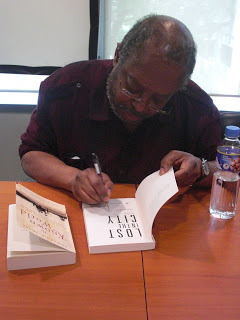 Edward P. Jones signing my booksNext I went to "So You Got Yourself Published. Now What?" with the same great panel of agents and editors. And finally I presented with author Carljoe Javier on teaching fiction writing. Great fun!
Edward P. Jones signing my booksNext I went to "So You Got Yourself Published. Now What?" with the same great panel of agents and editors. And finally I presented with author Carljoe Javier on teaching fiction writing. Great fun!
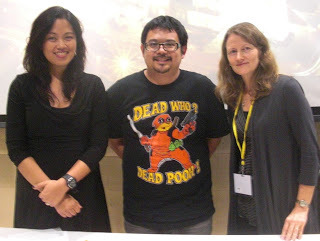 with Andrea Pasion-Flores, Executive Director of the NBDB, and author Carljoe JavierAnd the amazing Tarie Sabido, book blogger extraordinaire, and Honeylein de Peralta, Managing Editor of Flipside Digital Content, then took me to Intramuros, the old walled city. Not ideal timing since it was dark and the fort was closed, but it was so nice to have a glimpse at the area, even at night. We had a perfect meal of Filipino specialties at Illustrado to cap off my visit.
with Andrea Pasion-Flores, Executive Director of the NBDB, and author Carljoe JavierAnd the amazing Tarie Sabido, book blogger extraordinaire, and Honeylein de Peralta, Managing Editor of Flipside Digital Content, then took me to Intramuros, the old walled city. Not ideal timing since it was dark and the fort was closed, but it was so nice to have a glimpse at the area, even at night. We had a perfect meal of Filipino specialties at Illustrado to cap off my visit.
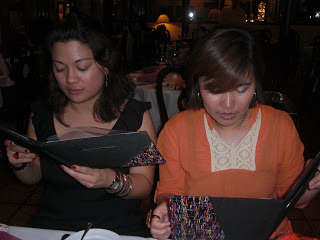 Tarie and Honey pore over the menu at Illustrado
Tarie and Honey pore over the menu at Illustrado
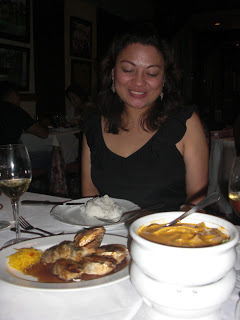 Excellent choices, Tarie!I look forward to reading more stories from the Philippines and I believe that we will soon be seeing more and more literature coming from this multilingual, diverse and complex country. The Philippines has MA, MFA, and Ph.D. programs in creative writing. There is tremendous energy and drive in the writing community, and I predict that we'll soon see more of its talented authors emerging into the spotlight. Thank you, Manila!
Excellent choices, Tarie!I look forward to reading more stories from the Philippines and I believe that we will soon be seeing more and more literature coming from this multilingual, diverse and complex country. The Philippines has MA, MFA, and Ph.D. programs in creative writing. There is tremendous energy and drive in the writing community, and I predict that we'll soon see more of its talented authors emerging into the spotlight. Thank you, Manila!
Day 1 I had no presentations so was able to mingle and listen to presentations. The keynote talk by Resil Mojares "Where in the World is the Filippino Writer?" was followed by "Writing from the Margins" featuring Pulitzer prize winners Junot Diaz and Edward P. Jones, including short readings of their work. Discussion ranged from similarities between the Philippines and the Dominican Republic, race as an undercurrent in the U.S., the authors' role models, the differences between short stories and novels, and the thinking groundwork for a novel (ten years of thinking for Edward P. Jones's The Known World).
 Edward P. Jones and Junot Diaz
Edward P. Jones and Junot DiazIn the afternoon I floated a bit, and peeked in on "In Search of the Next Great Philippine Novel" with authors Jose Dalisay, Jr., Charlson Ong, Alfred Yuson and Edgar Samar.
Following those I attended the lively "Conversation with Junot Diaz." His talk covered his personal background, reading, writing, history and its interplay with writing, and the obligation for every artist to strive to do what no one else is doing. Powerful.
 with Junot DiazBook blogger Tarie Sabido then introduced me to her circle of book blogging friends who took me out to sample a few Filipino dishes and a weng weng drink before I attended the dinner for speakers at the Ayala Library.
with Junot DiazBook blogger Tarie Sabido then introduced me to her circle of book blogging friends who took me out to sample a few Filipino dishes and a weng weng drink before I attended the dinner for speakers at the Ayala Library.  with Tarie Sabido, standing, and book bloggers and friendsDay 2 I had three panel presentations. First was "The Stranger Experience" on writing away from home, cross-cultural experiences, and the multi-faceted immigration experience with Junot Diaz, Gemma Nemenzo and me.
with Tarie Sabido, standing, and book bloggers and friendsDay 2 I had three panel presentations. First was "The Stranger Experience" on writing away from home, cross-cultural experiences, and the multi-faceted immigration experience with Junot Diaz, Gemma Nemenzo and me. with Junot Diaz and Gemma Nemenzo, Managing Editor of the U.S. magazine FilipinasNext was a panel on writing for young adults with author Perpi Alipon-Tiongson and publisher RayVi Sunico.
with Junot Diaz and Gemma Nemenzo, Managing Editor of the U.S. magazine FilipinasNext was a panel on writing for young adults with author Perpi Alipon-Tiongson and publisher RayVi Sunico. with RayVi Sunico, Perpi Alipon-Tiongson and Tarie SabidoBook bloggers then took me to Via Mare for more excellent Filipino food for lunch.
with RayVi Sunico, Perpi Alipon-Tiongson and Tarie SabidoBook bloggers then took me to Via Mare for more excellent Filipino food for lunch. 
After lunch I caught part of "Of Folktales, Myths and Legends" featuring authors who have drawn inspiration from the folklore of the Philippines--I wished I'd been able to catch more about the intriguing tales and legends. And after that I presented on a panel "The Many Forms of the Novel" in which I spoke about writing in verse and read an excerpt from Orchards. I was pleased to meet Que Mai, poet from Vietnam and to come home with one of her books of poetry. I expect she'll be coming out with a novel in verse in the future... It was exciting to share the news of Thanhha Lai's National Book Award win with her on the day it was announced.
 with poet Que MaiThat evening I was invited to the home of Yvette Fernandez, Editor-in-Chief of the Philippines Town and Country magazine. There I enjoyed a Filipino feast, a bit more conversation with Junot Diaz before he left for the airport, family conversations, and amazing mango, rice cake and turon (banana rolls).
with poet Que MaiThat evening I was invited to the home of Yvette Fernandez, Editor-in-Chief of the Philippines Town and Country magazine. There I enjoyed a Filipino feast, a bit more conversation with Junot Diaz before he left for the airport, family conversations, and amazing mango, rice cake and turon (banana rolls).  Filipino hospitalityAnd I learned that there are some impressive beetles in the Philippines.
Filipino hospitalityAnd I learned that there are some impressive beetles in the Philippines. 
Friday morning I caught up with Nikki Torres, Assistant Regional Advisor of SCBWI Philippines, at an early breakfast meeting--it was so good to meet face to face. Next time I'm in the Philippines I hope to have more time to do an event with the chapter.
 with Dominique (Nikki) Garde TorresAt the festival Day 3, I attended the panel "Mentoring the Writer" with Jayapriya Vasudevan and Priya Doraswamy of Jacaranda Press, Rachel Kahan, Senior Editor at G.P. Putnam, and Ravi Mirchandani, Editor-in-Chief of Atlantic Books U.K., which opened with a contract signing with crime writer F. H. Batacan.
with Dominique (Nikki) Garde TorresAt the festival Day 3, I attended the panel "Mentoring the Writer" with Jayapriya Vasudevan and Priya Doraswamy of Jacaranda Press, Rachel Kahan, Senior Editor at G.P. Putnam, and Ravi Mirchandani, Editor-in-Chief of Atlantic Books U.K., which opened with a contract signing with crime writer F. H. Batacan.  Blurry, but a great celebratory moment with Priya Doraswamy and Jayapriya Vasudevan and F. H. Batacan, seated, with NBDB's Andrea Pasion-Flores and Neni Sta. Romana Cruz in the back
Blurry, but a great celebratory moment with Priya Doraswamy and Jayapriya Vasudevan and F. H. Batacan, seated, with NBDB's Andrea Pasion-Flores and Neni Sta. Romana Cruz in the back Ravi Mirchandani (Atlantic U.K.), Rachel Kahan (G. P. Putnam), Priya Doraswamy (Jacaranda Press), Jayapriya Vasudevan (Jacaranda Press) and author Jose Dalisay, Jr.Next up was "A Conversation with Edward P. Jones" in which he shared his background and his amazing brain that held the details of his book The Known World for ten years before he began writing. He spoke on revision, the importance of reading, and the need for everyone to discover their talent.
Ravi Mirchandani (Atlantic U.K.), Rachel Kahan (G. P. Putnam), Priya Doraswamy (Jacaranda Press), Jayapriya Vasudevan (Jacaranda Press) and author Jose Dalisay, Jr.Next up was "A Conversation with Edward P. Jones" in which he shared his background and his amazing brain that held the details of his book The Known World for ten years before he began writing. He spoke on revision, the importance of reading, and the need for everyone to discover their talent.  Edward P. Jones signing my booksNext I went to "So You Got Yourself Published. Now What?" with the same great panel of agents and editors. And finally I presented with author Carljoe Javier on teaching fiction writing. Great fun!
Edward P. Jones signing my booksNext I went to "So You Got Yourself Published. Now What?" with the same great panel of agents and editors. And finally I presented with author Carljoe Javier on teaching fiction writing. Great fun!  with Andrea Pasion-Flores, Executive Director of the NBDB, and author Carljoe JavierAnd the amazing Tarie Sabido, book blogger extraordinaire, and Honeylein de Peralta, Managing Editor of Flipside Digital Content, then took me to Intramuros, the old walled city. Not ideal timing since it was dark and the fort was closed, but it was so nice to have a glimpse at the area, even at night. We had a perfect meal of Filipino specialties at Illustrado to cap off my visit.
with Andrea Pasion-Flores, Executive Director of the NBDB, and author Carljoe JavierAnd the amazing Tarie Sabido, book blogger extraordinaire, and Honeylein de Peralta, Managing Editor of Flipside Digital Content, then took me to Intramuros, the old walled city. Not ideal timing since it was dark and the fort was closed, but it was so nice to have a glimpse at the area, even at night. We had a perfect meal of Filipino specialties at Illustrado to cap off my visit. Tarie and Honey pore over the menu at Illustrado
Tarie and Honey pore over the menu at Illustrado
 Excellent choices, Tarie!I look forward to reading more stories from the Philippines and I believe that we will soon be seeing more and more literature coming from this multilingual, diverse and complex country. The Philippines has MA, MFA, and Ph.D. programs in creative writing. There is tremendous energy and drive in the writing community, and I predict that we'll soon see more of its talented authors emerging into the spotlight. Thank you, Manila!
Excellent choices, Tarie!I look forward to reading more stories from the Philippines and I believe that we will soon be seeing more and more literature coming from this multilingual, diverse and complex country. The Philippines has MA, MFA, and Ph.D. programs in creative writing. There is tremendous energy and drive in the writing community, and I predict that we'll soon see more of its talented authors emerging into the spotlight. Thank you, Manila!
Published on November 23, 2011 00:02
November 14, 2011
Meeting up with Semester at Sea Professor and Students
Today I had an opportunity to meet up with a group of students from the Semester at Sea program...now in Japan and nearing the end of their around-the-world tour. You can read blogposts of their current voyage here. Professor Rashna Singh, my former World Literature in English professor in the graduate program at New York University some years back, had contacted me to meet up with the group. She asked me to talk to them about my Japan-set writing in a program titled How Place Informs Story. It was a rushed visit but we walked and talked and zipped up to Hachiman Shrine in Kamakura as the sun was setting, then ate okonomiyaki.
Here we are just before heading up the Dankazura walkway that leads to Tsurugaoka Hachiman Shrine--the group includes current college students and lifelong learner adult students:
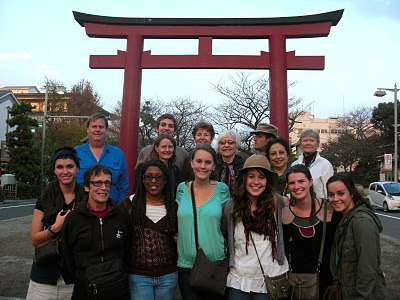 And Professor Singh with me on the shrine grounds:
And Professor Singh with me on the shrine grounds:
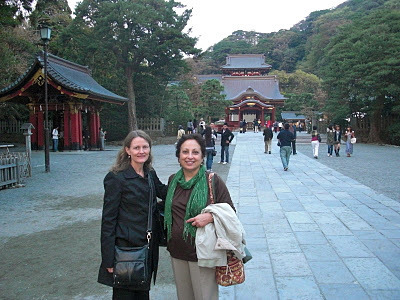 Rashna Singh is the author of, among other titles, Goodly is Our Heritage: Children's Literature, Empire, and the Certitude of Character. I loved Professor Singh's world literature class at NYU; one paper I wrote for her on the use of non-English words in English language fiction--a comparative study of three novels--had me spending hours learning bits of Swahili. Words she said in her course have continued to guide me and resonate with me for years as I write my books. Some teachers truly become lifelong friends and mentors.
Rashna Singh is the author of, among other titles, Goodly is Our Heritage: Children's Literature, Empire, and the Certitude of Character. I loved Professor Singh's world literature class at NYU; one paper I wrote for her on the use of non-English words in English language fiction--a comparative study of three novels--had me spending hours learning bits of Swahili. Words she said in her course have continued to guide me and resonate with me for years as I write my books. Some teachers truly become lifelong friends and mentors.
Wishing the SAS group smooth sailing as they head to Hawaii then Central America!
Here we are just before heading up the Dankazura walkway that leads to Tsurugaoka Hachiman Shrine--the group includes current college students and lifelong learner adult students:
 And Professor Singh with me on the shrine grounds:
And Professor Singh with me on the shrine grounds: Rashna Singh is the author of, among other titles, Goodly is Our Heritage: Children's Literature, Empire, and the Certitude of Character. I loved Professor Singh's world literature class at NYU; one paper I wrote for her on the use of non-English words in English language fiction--a comparative study of three novels--had me spending hours learning bits of Swahili. Words she said in her course have continued to guide me and resonate with me for years as I write my books. Some teachers truly become lifelong friends and mentors.
Rashna Singh is the author of, among other titles, Goodly is Our Heritage: Children's Literature, Empire, and the Certitude of Character. I loved Professor Singh's world literature class at NYU; one paper I wrote for her on the use of non-English words in English language fiction--a comparative study of three novels--had me spending hours learning bits of Swahili. Words she said in her course have continued to guide me and resonate with me for years as I write my books. Some teachers truly become lifelong friends and mentors. Wishing the SAS group smooth sailing as they head to Hawaii then Central America!
Published on November 14, 2011 04:14
November 12, 2011
The Amazing Mary Kole in Tokyo
Thanks to an SCBWI regional grant, SCBWI Tokyo was fortunate to host Agent Day with Literary Agent Mary Kole from the Andrea Brown Literary Agency. Full disclosure...my agent, Jamie Weiss Chilton is also from the same agency. But the impetus for this event came not from me but from SCBWI Tokyo members eager to meet Mary, who regularly doles out so much helpful advice on her kidlit.com website.
The event took place at Yokohama International School on October 29 and 30. On Saturday she gave a full day of talks--on craft, on queries and on first pages. Using actual sample queries and first pages from SCBWI Tokyo and SCBWI Hong Kong members, Mary offered helpful, humorous and honest feedback; her suggestions for improvement seemed to be appreciated by all participants, whether pre-published or published. Mary also squeezed in fifteen 15-minute face to face private critiques over two days. Despite the rigorous schedule, Mary enthusiastically joined members for lunch on Saturday and for dinner at a Motomachi izakaya on Saturday.
On Sunday at the end of the marathon event, I had a chance to take Mary to one of my favorite gardens, Sankeien, for a quick stroll and soba lunch.
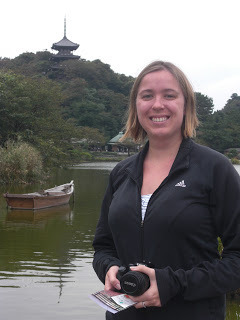 Mary at Sankeien Gardens in Yokohama
Mary at Sankeien Gardens in Yokohama
Thank you, Mary Kole, for coming to Japan!
The event took place at Yokohama International School on October 29 and 30. On Saturday she gave a full day of talks--on craft, on queries and on first pages. Using actual sample queries and first pages from SCBWI Tokyo and SCBWI Hong Kong members, Mary offered helpful, humorous and honest feedback; her suggestions for improvement seemed to be appreciated by all participants, whether pre-published or published. Mary also squeezed in fifteen 15-minute face to face private critiques over two days. Despite the rigorous schedule, Mary enthusiastically joined members for lunch on Saturday and for dinner at a Motomachi izakaya on Saturday.
On Sunday at the end of the marathon event, I had a chance to take Mary to one of my favorite gardens, Sankeien, for a quick stroll and soba lunch.
 Mary at Sankeien Gardens in Yokohama
Mary at Sankeien Gardens in YokohamaThank you, Mary Kole, for coming to Japan!
Published on November 12, 2011 04:53
November 9, 2011
Orchards helps support the Hafu film project
Hafu is a documentary film-in-the-making about the mixed-race experience in Japan. On Indiegogo.com the filmmakers are now trying to raise $10,000 to enable them to complete their project. There are some great perks for donating, including a copy of the film, music, and books (including five copies of Orchards). Check out the Hafu film page on Indiegogo.com.
This film evolved out of the Half Japanese Project, which aims to create a dialogue between cultures. It's a fascinating project with a great website that I've been following for several years and have used in my university discussion classes. Links to some interesting videos are at the bottom of their web page.
I'm so looking forward to the release of this film Hafu. Year by year Japan is becoming more multicultural, and year by year more mixed-race children are born in Japan. This cultural diversity deserves far more attention and celebration.
This film evolved out of the Half Japanese Project, which aims to create a dialogue between cultures. It's a fascinating project with a great website that I've been following for several years and have used in my university discussion classes. Links to some interesting videos are at the bottom of their web page.
I'm so looking forward to the release of this film Hafu. Year by year Japan is becoming more multicultural, and year by year more mixed-race children are born in Japan. This cultural diversity deserves far more attention and celebration.
Published on November 09, 2011 04:54



